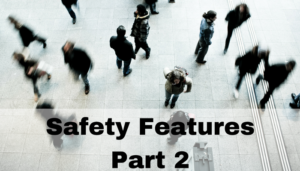Recently, I shared information regarding security during travel from an interview with Robert Riesmeyer of Traveling Aware. As a meeting planner, the responsibility extends beyond personal safety to the safety of attendees.
In fact, it is becoming increasingly important for companies to focus on this issue. The U.S. Department of Labor, through the general duty clause, is evaluating and, sometimes, fining employers who fail to follow through on their duties to warn employees of potential risks, such as elevated risks of terrorism or kidnapping for ransom. It’s ever more important to create an emergency action plan, educate employees about the plan, and follow through in the event of an emergency. A company that fails to do so can face legal consequences, including large financial settlements.
As a meeting planner, there are many important things to know.
- Know the venue. The exits, the access points, and potential hiding places are all important pieces of information. The meeting planner and staff should be privy to this information as should the security team, if one has been employed. Security staff should be allowed to come in before hand and become well acquainted with the venue. Keep in mind that if you are not able to visit the venue during the planning stages, I have feet on the ground (wearing stylish shoes, I’m sure) anywhere you want to go. HelmsBriscoe has over 1300 of my closest colleagues worldwide!
- Get to know the attendees personally. It’s impossible to know everything about every attendee, but it may be possible to be alerted to security concerns. As an example, be aware of any conflicts that arise between attendees, keep an eye on attendees who are drinking too much, and watch for uninvited guests. It may not be necessary to confront, but awareness could help to prevent issues before they arise.
- Know the nature of the business. A planner should be well aware of any intellectual property or sensitive information involved in the event. Sensitive business may require additional cyber security, for example. Also, one needs to be aware of any possible information that may be a target for a foreign agent. Even if high-level executives aren’t present, risks could be. In fact, in corporate for ransom kidnappings, where the goal is financial gain, the most common victim is a middle level associate.
- Know the threats. Though kidnapping for ransom happens, the more common threat in the U.S. and abroad is petty crime. This includes identity theft, credit card theft, pickpocketing, etc. Again, situational awareness and common sense is key. Guarding information, both personally and as the individual holding attendees’ information, is crucial.
- Inform attendees. Share information about personal and professional safety with attendees. Provide information regarding exits. Also, be sure to let attendees know who to contact or where to go if they have any concerns. A written crisis management plan may also be required.
It isn’t pleasant to think about potentially dangerous issues that could happen at an event. However, knowing what to do in a crisis situation could greatly improve the outcome. To the smart meeting planner (you, of course), this is priceless.





